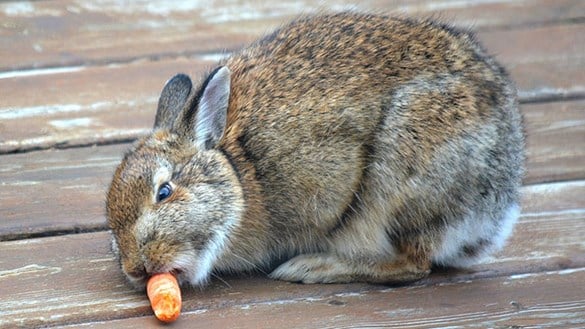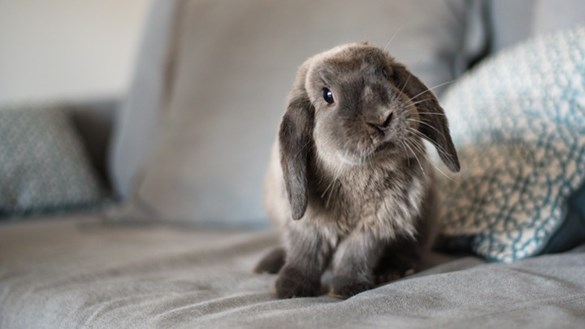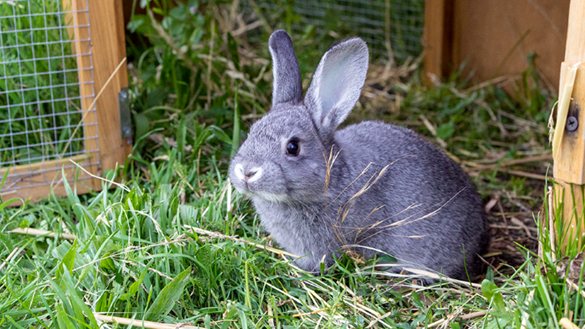Your Guide To Rabbit Nutrition
Feeding your rabbit the right diet can help keep them healthy for years to come. Understanding how much to feed them can play a key role in maintaining a healthy weight, as well as knowing how many treats they’re allowed.
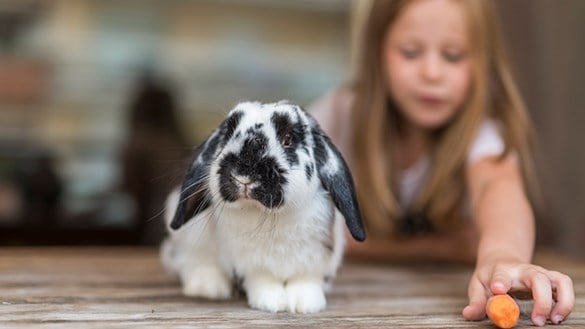
Not only does the right food give them all the nutrients they need, but it can also help improve their dental health and regulate their digestive system.
Keep reading for our advice on the best nutrition for your rabbit.
Which is the right diet for a rabbit?
Pet rabbits are very similar to their wild cousins and their nutritional needs are almost identical. Rabbits are herbivores, meaning their body can only digest plants, such as hay, grass, vegetables, and pellets. They need plenty of high-quality fibre to maintain healthy teeth (which continue to grow throughout their lives) and a healthy gut. Feeding your rabbit the wrong food or portion size can result in weight gain, urinary issues and even dental problems.
A good rabbit's diet should be composed as shown below:
85% hay or grass
10% leafy vegetables
5% pellets (around an egg cup full)
How much grass and hay should rabbits eat?
Hay and grass should make up around 80% of your rabbit’s diet, so they should have unlimited access to it. This can be fresh or dried grass, or meadow hay. These contain all the nutrients your rabbit needs while also wearing down their teeth to prevent them from overgrowing. If your rabbit doesn’t eat enough hay and grass, they can develop painful spurs on their teeth which cut into their gums and tongue, making eating very difficult.
Always choose a good quality hay product: it should be dry, sweet-smelling and free from grit, dust and mould. Speciality feeding hays are also available which provide variety in flavour and nutrients. Alfalfa hay can be very rich so should only be fed as an occasional treat. Don’t feed your rabbit lawnmower clippings as they ferment quickly and can be extremely harmful to your pet’s digestion.
What fruit and vegetables can rabbits eat?
Rabbits can have a small number of vegetables each day, accounting for around 15% of their diet. This not only provides different nutrients; it also gives your rabbit a range of flavours and textures to enjoy. It’s important to remember that not all vegetables are safe to eat as they can be toxic or upset their delicate stomachs.
Rabbit-safe vegetables include:
- Asparagus
- Basil
- Broccoli
- Brussels sprouts
- Carrots
- Celery leaves
- Chard
- Courgette
- Dock
- Green beans
- Romaine lettuce
- Parsley
- Radish tops
What food is unsafe for rabbits?
You might think that it’s okay to feed most vegetables to rabbits. But that isn’t the case. Below is a list of foods that are either toxic for rabbits or will cause them great discomfort – either way they are to be avoided:
- Avocado, one of the deadliest foods for a rabbit
- Onions
- Peas
- Chocolate
- Nuts, rabbits love the taste of them – but they should be avoided
- Iceberg lettuce
- Parsnips
- Rhubarb
- Garlic
- Meat, eggs, and diary – rabbits are just not able to digest these foods, although as herbivores, most rabbits won’t be interested in trying
Please note this is not an exhaustive list, if you are unsure please talk to your vet.
Should I feed my rabbit pellets?
Pellets can be offered to supplement your rabbit’s food to ensure they receive a balanced diet. This should only amount to five per cent of their diet. Always go for high-quality pellets instead of muesli style foods.
In fact, choosing muesli food is one of the most common mistakes owners make. While it may look more interesting, muesli encourages selective feeding and your rabbit may not get all the nutrients they need. This can lead to further health conditions and overgrown teeth.
A great way to check you’re feeding your rabbit correctly is by checking their droppings; they should be large and look like compressed hay. Your vet is best placed to offer tailored advice about your rabbit’s diet, taking into account their age, lifestyle, and any existing health conditions. It's also normal for a rabbit to eat their own droppings.
Should I stick to the same food throughout a rabbit's life?
Unlike dogs' and cats’, rabbits’ nutritional needs don’t change as they age, so you shouldn’t need to alter their diet as they grow. They’ll still need an unlimited amount of hay and grass, supplemented with fresh veg and high-quality pellets.
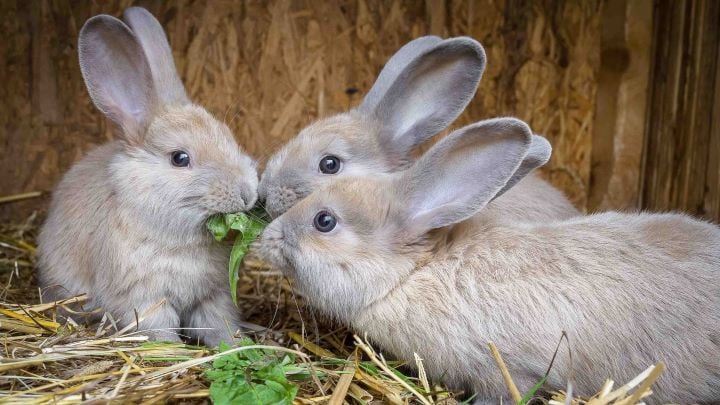
That said, many rabbits become less active in their later years, so may require less food than usual to maintain a healthy weight. Talk to your vet for their advice on your rabbit’s needs.
How much should I feed my rabbit?
The amount your rabbit should eat relates to their breed, age, and size. They should always have access to hay and grass – there’s no such thing as too much. An average-sized rabbit (around 2.5kg), should also have about 250g of fresh green vegetables and 60g of pellets.
If you can feel their backbone when you stroke them, they may be underweight. Similarly, it’s unusual to feel their hip bones except in very slender breeds. Fatty pads on their shoulders, legs, and groin can be a sign your pet is overweight. Thick fur can hide your rabbit's true shape, so it’s important that you feel them to understand whether they’re under or overweight. Your vet will also weigh them at their health check to ensure they’re in good shape.
Once you’ve settled on the right amount of food for your rabbit, it’s a good idea to weigh out their pellet portion at the start of the day to avoid overfeeding. Rabbits are commonly overfed, leading to weight gain and further health issues, so this is a key step in maintaining a healthy weight.
How often should I feed my rabbit?
You should check their run regularly to make sure they have plenty of hay to eat, topping it up throughout the day as necessary. On top of this, their daily amount of fresh vegetables and pellets should be divided into morning and evening meals to give them a chance to digest. Splitting up their meals also gives you the opportunity to check up on them, particularly if they live outdoors.
Consistency is key, so always stick to your chosen feeding routine.
How many treats can I give my rabbits?
Sugary and starchy treats can lead to heart issues, obesity and tooth decay, so it’s important to limit how many you offer. Avoid commercial treats such as yoghurt drops and sweetened cereal sticks as they’re high in sugar. Instead, opt for the occasional healthy treat of fresh coriander, a chunk of broccoli or mangetout.
If you do decide to treat your rabbit, it’s important to slightly reduce their regular food to balance out their daily intake.
Don’t forget to hydrate
Water is an essential part of your rabbit’s nutrition, and not drinking enough carries serious consequences. As well as being essential for their body to function, water flushes out excess calcium which can build up in rabbits, causing urinary stones and bladder problems.
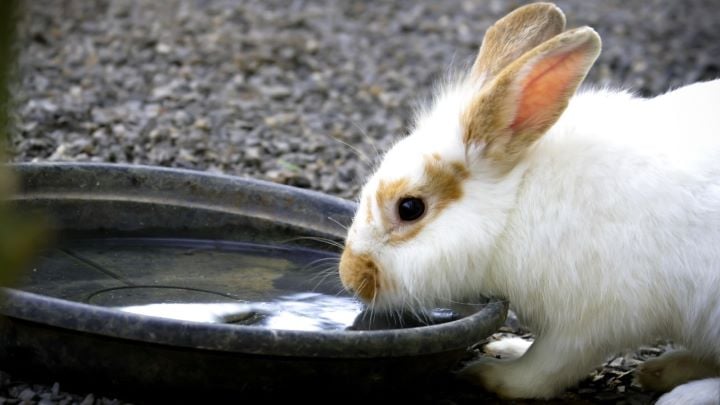
Provide both a water bowl and a bottle to ensure that your rabbit always has access to fresh, clean water. Water bottles often become clogged and can harbour bacteria, so always take care to clean them thoroughly.
In some cases, excessive thirst can be a sign of an underlying condition. Always speak to your vet if you have any concerns about your rabbit's diet or hydration.
Rabbit nutrition FAQs
The vegetables you shouldn’t feed your rabbit include avocado, potatoes, , corn, beans, seeds, and nuts. You should also avoid feeding them iceberg lettuce, rhubarb and mushrooms. This is not an exhaustive list, so it’s good to check before feeding your rabbit a new type of vegetable.
We recommend feeding your rabbit a well-balanced diet of vegetables including bell peppers, bok choy, brussels sprouts, carrot tops, cucumber, fennel, radish tops, courgettes. Vegetables to give rabbits once or twice a week include broccoli, carrots, chard, dandelion greens, kale, and spinach. You should also include plenty of water, fresh hay, and a few pellets.
In the wild, a rabbit’s natural diet would usually be made up of grasses, hay, herbs, and bark; all of which are high fibre foods.
Twice a day, although they should always have free access to hay and water.
You should never feed your rabbit yoghurt or any dairy products, bread, pasta, biscuits, crackers, avocado, cereal, iceberg lettuce, silverbeet, or hamster food. They shouldn’t be fed nuts or seeds, oatmeal, chocolate, peanut butter, potatoes, rhubarb, meat, cauliflower.
Your rabbit should always have access to unlimited hay and fresh water. They can also be given vegetables such as; bell peppers, bok choy, brussels sprouts, carrot tops, cucumber, fennel, radish tops, courgettes daily to ensure a healthy, balanced diet. A good measure of a healthy diet is 85% hay or grass, 10% leafy green vegetables and 5% pellets (around an egg cup).
Yes, many rabbits are over fed or don’t have the right balance in their diet. If possible, weigh out the food at the beginning of the day and then split it to cover two feeds a day. Minimal treats, but if you do provide treats – make sure you’ve decreased their normal daily food allowances.
Speak to your local Medivet practice for tailored advice on your rabbit’s diet.
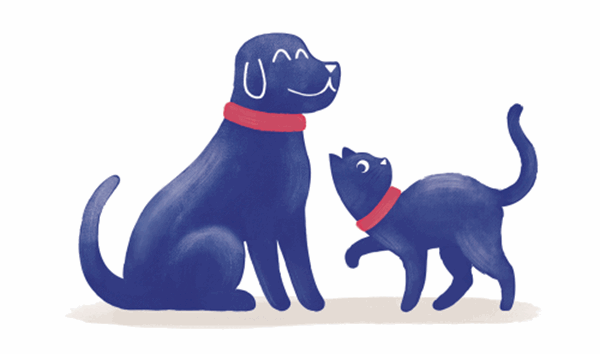
Medivet Healthcare Plan
On average our clients save an average of £225 with the Medivet Healthcare Plan.
Learn more
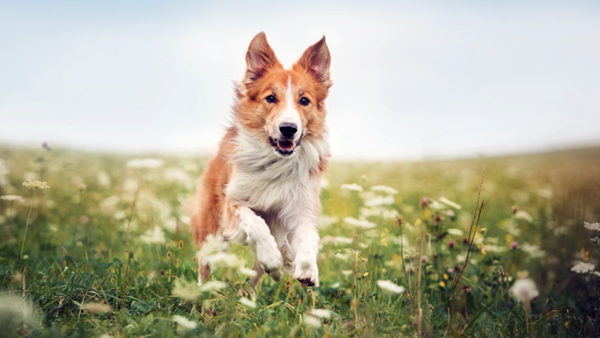
Our Pet Care Advice
At Medivet, we’re committed to providing trustworthy, expert advice that helps you care for your pet. Don't miss our latest advice for keeping your pets happy and healthy.
Search advice


